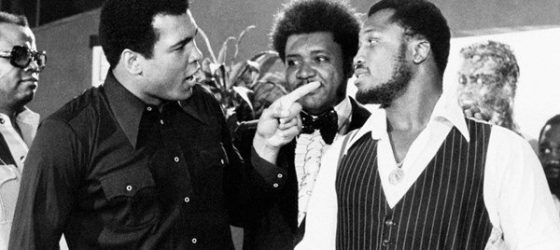Muhammed Ali has passed, but his legacy will endure and so will a great lesson in storytelling. To build a compelling hero, the protagonist must face a compelling antagonist. Here’s why we can thank Joe Frazier for his role in Muhammed Ali’s story.
# # #
“I am the greatest!”
Indeed, Muhammed Ali proclaimed himself as boxing’s greatest more than once.
But who would’ve cared if Ali’s rivals were mediocre?
What made Ali such a compelling personality was the fact that he continually faced great antagonists — from the U.S. government in the Vietnam War draft to the Parkinson Syndrome that challenged him late in life.
And of course, his opponents in the ring.
Enter Smokin’ Joe Frazier
To many including myself, the most memorable images of Ali’s storied career were his heavyweight fights with Smokin’ Joe Frazier, the relentless aggressor. Frazier seemed to never stop coming, driving Ali back with bruising left hooks and vicious right upper cuts.
And Ali never seemed to stop playing rope-a-dope, tiring Frazier out by playing the role of yin versus Frazier’s yang, before the judges would give a unanimous decision after a gruelling battle, or before the ref would stop the fight before the last round to save the gutsy opponent from possible death.
Of course, Ali did not win every battle, and this is a critical component to great storytelling, generally, and the Hero’s Journey, specifically.
The antagonist wins some of the battles, providing the protagonist with major setbacks and making the storyline all the more compelling.
The Antagonist Makes The Protagonist Interesting
As best-selling author William Bernhardt says in his Red Sneakers writing workshops, “Your protagonist is only as interesting as your antagonist makes him.”
I use that quote often, in fact, as recently as my TEDxHochschuleLuzern Talk last month: Coffee With JK Rowling – Storytelling & The Hero’s Journey.
In the Harry Potter series, Lord Voldemort is the antagonist that makes Harry such a compelling hero, and the story itself such a compelling one. In The Matrix, Agent Smith is the antagonist who personifies the dark side, and whose darkness makes Neo struggle, helping to bring out the best in Neo, and giving us the lesson to be learned.
Look at any great piece of literature or any great science fiction movie, and you’ll see. Without an interesting antagonist, the hero-protagonist would simply be uninteresting.
This also works in business storytelling (provided that you, as a vendor, do not portray yourself as the hero. You are the mentor; your customer is the hero). In a business story, the antagonist could be the cruel marketplace, an organization that’s ill-equipped to succeed or, simply, a fierce competitor.
Is your antagonist compelling enough to bring out the very best in your hero?
The Going Really Does Have To Get Rough
It seemed like clear sailing for Ali early in his career.
After winning the gold medal in the 1960 Olympic Summer Games in Rome, Cassius Clay (Ali’s given name at birth) quickly became professional and proceeded to win his first 19 heavyweight bouts.
Champion Sonny Liston then gave Ali a shot at the title, and Ali had his way with Liston through six rounds. Bloodied and dazed, Liston did not come out of his corner for the seventh round. Ali had won. He was the new heavyweight champion.
But the story had sub-plots and secondary antagonists. The proverbial plot thickened.
After three years of successfully defending the crown, Ali was stripped of the title for refusing induction to the U.S. armed forces. He would not go to war in Vietnam! Indeed, the U.S. government and the world boxing authorities were secondary antagonists in this sub-plot, and they were compelling antagonists at that.
“I ain’t got no quarrel with those Vietcong!” Ali screamed.
While some Americans called him cowardly and others called him brave, Ali refused to serve in the military, holding strong to his principles, as heroes do.
In the ensuing vacuum at the top of heavyweight boxing, Smokin’ Joe Frazier, also an Olympic champion (Tokyo, 1964), fought his way to the top and became the heavyweight champion.
As the dust settled from the Vietnam War debacle, Ali wanted the championship back, and like the aforementioned heroes of Harry Potter and Neo, Ali did not win every battle against, who was to become, his biggest foe.
Frazier beat Ali in their first matchup — branded like the title of a great book, The Fight of The Century, in where else, New York’s Madison Square Garden.
In the 15th and final round, Frazier knocked Ali down with his famous left hook, and Frazier won by unanimous decision.
The hero, however, did not give up.
Three years later, neither Ali nor Frazier held the championship. George Foreman had, in the meantime, dethroned Frazier with a knock-out that left no doubt.
Ali now wanted Foreman, but Foreman put one condition on accepting a fight with Ali: Ali had to beat Frazier first.
And so Ali did, again in Madison Square Garden, and again in a gruelling battle that went the full distance. The judges gave the fight to Ali in a unanimous decision.
So Foreman gave Ali his shot that same year.
And Ali went on to beat Foreman with an eighth-round knock-out. The title was again Ali’s, but this was a mere sub-plot in the bigger story.
After winning back the heavyweight title, Ali gave Smokin’ Joe a rematch.
Their third and final fight, The Thrilla in Manila, is regarded by many as the greatest fight in the history of boxing. The lead-up to The Thrilla was bitter, with Ali trash-talking Frazier. Even with both men being black, Ali’s words today would be considered racist and hateful.
But Who Said The Hero Is All Good?
And who said the antagonist is all bad?
Going into The Thrilla in Manila, the roles of antagonist vs. protagonist were blurred, as if often the case with great writing — and as is often the case in character development entwined in a plot that keeps the audience on the edge of its seats.
The lead-up to the fight was loaded with Ali’s antics and Frazier’s bitter rebuttals. The two rivals even got into a shoving match in a joint interview with commentator, Howard Cosell.
The hatred between the two characters was palpable, and the story was as great as it ever got in boxing.
Ali reigned in Manila. Round after round, he chopped Frazier to pieces. But, like a bull facing a matador, Frazier persisted. Some wondered if Frazier would even survive the brutal 14th round… and by survive, we’re talking “live through it.” It was ugly, very ugly.
It ended with the ref calling the fight after the 14th, not allowing Frazier to leave his corner for the final round, because… Smokin’ Joe had lost his smoke.
Ali was clearly the undisputed heavyweight champion.
And the fight was clearly the climax of the greatest story in boxing history.
A Great Legacy Because Of A Great Storyline
What ratified Mohammed Ali as The Greatest was not his own claims that he was the greatest. It was the struggles he had to overcome, and the primary struggle came from a challenging and deserving antagonist: Joe Frazier.
Perhaps the American sports channel ESPN said it best. “In the ring, Frazier was a bull that didn’t need a cape… It was that relentlessness — the near-total abandonment of duck-and-cover, the philosophy that one must absorb punishment before one can properly distribute it — that defined Frazier’s boxing career and has defined his life.
“And it was that relentlessness that made him the perfect foil for his nemesis, Muhammed Ali. Discussing Frazier’s boxing career without bringing up Ali is like talking about Neal Armstrong without mentioning the moon.”
No doubt, it works both ways. Discussing Ali’s heroic career without bringing up Frazier as his primary antagonist would simply be lame storytelling…
… because the protagonist is only as interesting as the antagonist makes him.
# # #
I help marketers tell their brand story, and I help sales teams improve their performance by putting the “love” into the sales process. The tools and techniques vary, but the mindset is simply a heart-set.
Let’s talk about storytelling, marketing… and your sales performance. Contact me here or sign up for my blog posts below. I also love the telephone. (And, if you’re in sales, so should you!)
Feel free to call me at +41 76 43 43 043 or send a message here and I’ll call you.
# # #
Photo by BreakingNews.ie

